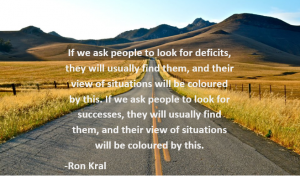What have we done so far?

These past few weeks we have worked long hours, met up numerous times, overcome group challenges and accomplished all of the work we had set out to do. Since our last post, we have put together, edited and presented our project proposal. We started by meeting up as a group and outlining the presentation and report. From there, we split up the sections of the proposal and spent time working on them independently. We connected over Facebook and met up every few days to make sure we were all on the same page. Quality delegation and multiple editing processes helped us refine the flow and write a good proposal, leading to an excellent framework for the presentation.
On Wednesday (Oct 7) our professor organized a 2 hour long session for all of the different community project groups to meet up and deliver their proposal presentations to one another. We delivered our presentation to the other groups working on the Community Kitchen project. This presentation session was very helpful because our TA, Adrienne, gave us great feedback on our proposal, which we incorporated into our report. Adrienne’s feedback helped to clarify what the project expectations are and identify what areas of our group’s report needed the most work.
From presenting our proposal, we’ve realised that an effective way to ensure you fully understand a subject is to teach it or present it to someone else. Therefore, through the process of preparing and delivering our proposal, we were able to test our understanding of the project, and brush up on areas that we didn’t understand. We enjoyed hearing the other groups present and we thought it was interesting to see how the five groups all applied their own unique perspectives to the same project. This session gave us some great ideas for our report and broadened our view and understanding of the project.
Through the development of the proposal we have also come up with a set of goals for ourselves and recognized what elements may come to be limitations in our project. We now feel ready to gather the data we need, and to continue on to an
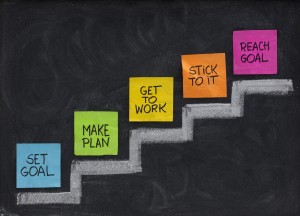
analysis that will generate some recommendations for the City of Vancouver. Something else we learned that will help us with our analysis is how to look at a project through the Asset Based Community Development lens. This means that we are adjusting our language to eliminate unnecessary, negative interpretations, which we’ve found has really challenged our way of thinking.
Our group dynamic has also improved, and continues to get better. We recognize that we are busy students, and that coordinating times to meet can be challenging. One way we’ve overcome our coordination challenge is by using Google Docs to work together when it is not feasible to meet in person. We can make edits visible to
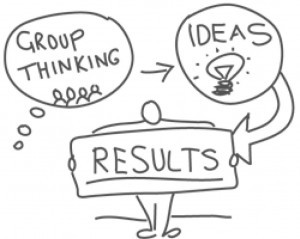
everyone, and use the live chat function to communicate while working. When we do meet as a group, we try to focus on discussing our upcoming tasks and assignments, and delegate them amongst the group. This allows us to be on the same page and makes sure we are brainstorming ideas together so everyone’s input is taken into account, but allows us to work on assignments at our own convenience so that everyone is able to manage their time efficiently.
What do we still have to do?
Building on our achievements thus far, we hope to keep the momentum going as we dive into the main portion of this project: data gathering and analysis! Moving forward, we have a few main objectives we intend to tackle and many of them focus on the relationships we are about to start with community kitchen members.
In the upcoming weeks, our primary objective is to make contact with our kitchen and community members so we can get in and start surveying the kitchens. Our strategy for completing this is to first try and find a contact at each of the organization’s which we were provided with. We will do this through online searches, emails, and phone calls. Once we make contact with the organization and find out who manages the kitchen, we’ll reach out to them either through phone or email (or by an on-site visit as a last resort) and try and set up a time to meet and go through the survey. The meeting times will be based on our availability as well as that of the community member’s.

We are hoping to meet with all of our community partners and finish gathering all of our data within the next 3 weeks.. To do this, we will have to strategically divide ourselves up to optimize our time. Ideally, we will visit kitchens in pairs based on our availabilities. These meetings, ideally, will happen on site so we can make some observations about the kitchen while we survey.Aside from those immediate objectives, an ongoing objective is to incorporate and reflect on the feedback we received from our TA. We plan to incorporate some of her constructive feedback into past and upcoming blog posts, and our final report. After each assignment is graded, we will take the time to sit down as a group and read over the feedback. Afterwards, we’ll brainstorm ideas to improve on our work, and then delegate various tasks amongst ourselves. We don’t always know what the expectations are, so receiving the ongoing feedback is really helpful and we can use it to improve our work.
What have we learned so far?
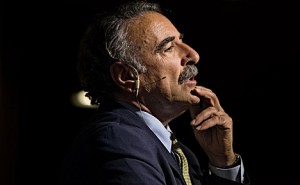
During our group’s presentation this past week, we faced a challenging question from one of our classmates that really stumped us and confronted our way of thinking about the project. She asked us how we planned to incorporate the opinion of a community kitchen contact, if we didn’t agree with them. At first, we answered that we would try to incorporate the community’s ideas into our own recommendations. However, as we were giving the answer, we realized that this way of thinking was contradictory to the Asset Based Community Development (ABCD) framework that had been discussed in previous lectures and readings. Our group member Patrick interceded, and gave an answer that linked back to a TED Talk we listened to by Ernesto Sirolli, which talked about the importance of listening to people’s ideas rather than trying to decide what you think is best for them. This short video really caused us to reflect on what role an ABCD perspective can play in how we react to these situations.
During our next group meeting, we discussed how the three podcasts we were assigned to listen to: “The Fish Bank” by Jensi Sartin, “A Pragmatic Idealist” by Sisonke Msimang, and “Grandma Mahembe’s Farm” by Lindiwe Majele Sibanda – all had an element of ABCD in them. One of the themes we identified in all of the podcasts is how making assumptions can prevent us from understanding the root cause of a problem, and that sometimes simply listening can prevent this. These podcasts also demonstrated that an institutional body or an individual’s ideals can overshadow the real-life needs and struggles of a person or community. Learning from these themes, it became more clear to us why approaching our community project through an ABCD lens will be valuable.
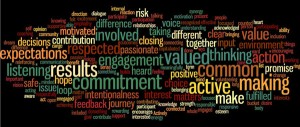
Why does it matter?
What we learned from our moment of significance and from reflecting on the themes in the three podcasts is important because we will be applying the ABCD principles when we visit our community partners.
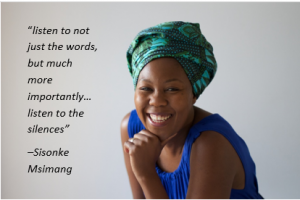
In Sisonke Msimang’s podcast, she explains how she believed her friend, Prudence, was a strong, empowered woman, with the ability to remain unchanged in the face of illness. It wasn’t until she realised that Prudence was only human and vulnerable to the burdens of life, that Sisonke then understood that her assumptions about Prudence had left her blind to her friend’s struggles. Listening to these stories have allowed us to realize that the ABCD principles are not only embedded in the method of our data collection, but in the way that we interact with members of community kitchens and by taking an ABCD approach, we can avoid assumptions similar to those Sisonke made about Prudence.
As students working on behalf of institutional bodies like the City of Vancouver and UBC, we need to ensure that the community kitchens don’t feel that we are intruding into their space and making judgements that don’t reflect the goals of their kitchen. It can be fairly common practice for those with strong ideals to undermine the traditional knowledge of community members and this is illustrated by Lindiwe Majele Sibande in “Grandma Mahembe’s Farm.” She discusses how success changed her relationship with food and devalued the food of her family farm; what she recognized as success drew her towards westernized food such as pop and burgers.
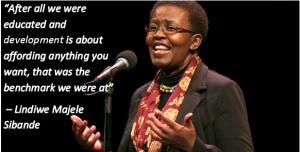
Consequently, she gained a lot of weight and was embarrassed as she represented everything she was advocating against. This shocking realization took her through an intensive journey of reconnecting with the food of her family farm and reevaluating her ideals on success. It’s possible that the ideals we have formed as students may cause us to ignore, or disregard the beliefs of the people we interact with in the community kitchens. By being mindful yet humble of what we have learned in LFS, we should be able to recognize the value of the experiences that our community partners have gained within the food system. A similar theme related to listening was also evident in “The Fish Bank” podcast when Jensi Sartin approached the government about making a fish bank and they did not take time to engage with the community and therefore did not know how to help, demonstrating the disconnect between the government and the community.
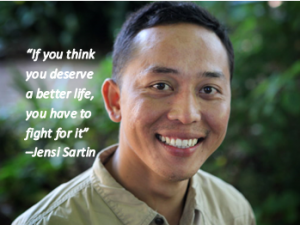
Instead of relying on outside help, Jensi looked to the community for answers by listening to the fisherman’s concerns. For our project, we will have to learn from Jensi and fosus on engaging in active listening when interacting with the members of the community kitchens, and not to let the priorities of UBC or the City of Vancouver overshadow our community partners responses. Just as Sisonke said in her podcast, in order for us to make an impact during this project, we will need to listen to both the words and the silences of our community partners.
What are we going to do about it?
Our moment of significance made us aware of the lens by which we are approaching this project and our approach to dealing with any conflicts that may arise. We will go to these community kitchens with an open mind and put emphasis on trying to understand the perspectives of community members. When we conduct our survey, we will separate our own opinions from the thoughts of the community contacts. However, we recognize that the cross-discipline background of our group can bring beneficial interpretation and analysis. Therefore, although we will separate our ideas from those expressed by our kitchen contacts, our report’s recommendations will build from both sets of knowledge. We hope this will ensure the actions taken by the City of Vancouver accurately represent what the community wants instead of what we assume community kitchens need. Prior to visiting the site and conducting the survey, we will read about the organization’s contributions to the community, their values and mission, in order to engage with community members meaningfully and improve our understanding of their perspectives. We also feel that taking advantage of the “comments” section, and really listening to the kitchen contact when going through the survey, will allow us to focus on the ABCD framework and exceed certain limitations of the pre-made survey.
